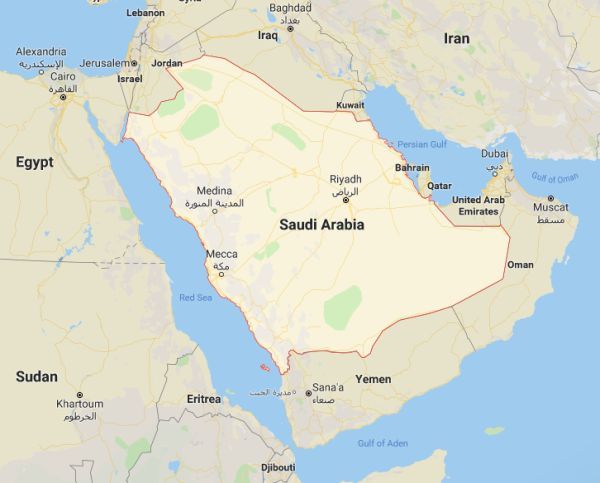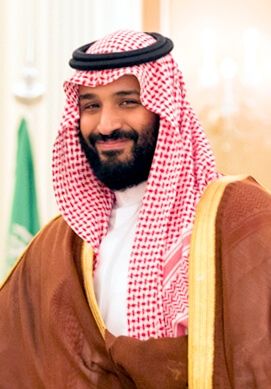Beneath the surface, relations are developing between Israel and Saudi Arabia, a powerhouse of the Arab world. Despite leaders’ efforts to keep their relationship low profile, Israel-Saudi relations over the last two decades have caught the attention of the Middle East and the wider world.
Israel’s burgeoning relations with Saudi Arabia, as well as ties with other Gulf states, mark an unprecedented shift as the focus of Arab countries switches from the Israeli-Palestinian conflict to dealing with the Iranian threat. Although Israel and Saudi Arabia have not established any official diplomatic relations, both sides perceive Iran to be their greatest enemy. This common fear is pushing the two nations together, opening channels of diplomatic, intelligence, and business cooperation.
Join the fight for Israel’s fair coverage in the news
A History of Opposition
Saudi Arabia originally opposed the formation of the state of Israel, voting against the UN Partition Plan for Palestine in 1947. Following the vote, Saudi Arabian troops participated in the fight against Israel in the 1948 Arab-Israeli war, committing around 1,000 troops to fight under Egyptian command. At the time, the Saudis played a key role in the Arab League, unifying with other Middle Eastern countries in opposition to Israel.
Saudi Arabia also contributed to the Yom Kippur War in 1973, airlifting around 2,000 troops to assist Arab forces in Syria. When Egypt signed a peace treaty with the Israelis, Saudi Arabia and other Arab States expressed their disapproval by cutting aid and diplomatic ties with Egypt. After almost a decade, Saudi Arabia rebuilt ties.
In 2002, Prince Abdullah, the de facto ruler of Saudi Arabia until his father’s death in 2005, led negotiations on the Palestinian situation. He proposed the Saudi Initiative, a plan to put an end to the Israeli-Palestinian and Arab-Israeli conflict. It called for resolving the Palestinian refugee issue, establishing eastern Jerusalem as the capital of a new Palestinian state, and having Israel concede territory in the Golan Heights, West Bank, and Gaza Strip.
After discussions, all 22 members of the Arab League embraced the peace initiative and asked Israel to accept it without negotiation. The US and EU initially welcomed the deal, hoping to take part in brokering peace in the Middle East. However, Israel objected, opposing the Arab League’s demand for Palestinian refugees’ right of return, a concession that could result in the Palestinian population outnumbering the Jews in Israel.
Israel-Saudi Arabia Relations: A Turning of the Tide?
Since these meetings over the Palestinian situation, Israel-Saudi Arabia relations have started to warm. The Saudis have been treading carefully though, toeing the line between support for Israel and commitment to the Saudi peace initiative.
The Saudis are befriending Israel mainly because of their decades old rivalry with Iran. Jonathan Marcus of the BBC explains:
Historically Saudi Arabia, a monarchy and home to the birthplace of Islam, saw itself as the leader of the Muslim world. However this was challenged in 1979 by the Islamic revolution in Iran which created a new type of state in the region – a kind of theocracy – that had an explicit goal of exporting this model beyond its own borders.
Saudi Arabia has a majority Sunni Muslim population and Iran’s people are overwhelmingly Shia, exacerbating the feud between them.
Today, the two countries are locked in a battle for regional dominance. In 2003, the US toppled Iraq’s Sunni leader Saddam Hussein, removing a major obstacle to Iran’s rise. Since then, the Iranians have expanded their influence, reaching into Syria, Lebanon, and other parts of the Middle East primarily by supporting Hezbollah, a Shia terrorist group seeking to target Israel. To push back, Saudi Arabia has engaged Iran in proxy conflicts around the region, backing opposing sides in Syria and Yemen.
The 2006 war between Israel and Hezbollah was a critical moment in regional dynamics. During the conflict, the first signs of a relationship between Saudi Arabia and Israel surfaced. The Saudi government condemned Hezbollah’s raid into Israel, an unprovoked terrorist attack that resulted in the death of five Israeli soldiers and the capture of two more.
This highlighted the Saudis’ opposition to Iran’s Middle East influence, a sentiment shared by the Israeli government.
Their mutual goal of containing Iran brought Israeli prime minister Ehud Olmert and Saudi national security adviser Bandar bin Sultan together for a meeting in Jordan in September of 2006. However, when news of this meeting was leaked to the public, Saudi officials were upset. A perception of cozying up to Israel could isolate Saudi Arabia from the other Arab nations, an outcome the Saudis have worked hard to prevent.

Covert Diplomacy
Through intelligence sharing, behind the scenes meetings, and even public support for each other, Israel and Saudi Arabia have gradually expanded diplomatic cooperation. Unexpectedly, a mutual dislike of Barack Obama’s presidency merged the two sides. Both countries opposed the Iranian Nuclear Deal (Joint Comprehensive Plan of Action), deeming it insufficient to prevent Iranian aggression.
Saudi Arabia also recognized that Israel’s technological prowess could make for a useful ally. Yossi Cohen, chief of Mossad, the Israeli intelligence agency, has met with Saudi Arabian officials regularly to share information and discuss strategy for security against Iran.
Cooperation has emerged in other diplomatic tracks as well. For example, when Saudi Arabia announced its plan in 2016 to take over the islands of Tiran and Sanafir from Egypt, Israel approved the deal.
More significantly, Saudi Arabia found itself in a storm of controversy after Jamal Khashoggi, a Saudi dissident and journalist for the Washington Post, was assassinated by Saudi government agents in Turkey. Despite the international criticism, Israeli prime minister Benjamin Netanyahu publicly defended Saudi Arabia. He was one of the few global leaders to do so.
Ian Black, senior fellow at the LSE’s Middle East Center, reported on a few other recent examples of intelligence sharing and diplomacy:
In 2012, when hackers breached the computer system of Saudi Aramco, the national oil company, Israeli businesses were called in. Israel reportedly sold drones to Saudi Arabia via South Africa, but denied that it had sold its “Iron Dome” system to defend the kingdom from missile attacks by Iranian-backed Houthi rebels in Yemen. In 2018 Israeli media were allowed by military censors to report that the Israeli and Saudi chiefs of staff had met at a Washington conference for commanders of US-allied armies. The Saudis denied the story.
Israeli-Saudi Arabian Ties: Under the Radar?
The Saudis have attempted to keep the eye of the international community off of their relationship with Israel, repeatedly denying any contact. In 2015, one Saudi journalist tweeted:
Fetishising non-existent collaboration between #Saudi/GCC states and #Israel has become a trend in western media/think tank circles.
— Mohammed Khalid Alyahya (@7yhy) October 15, 2015
Yet their effort to fly under the radar has not always proven successful. In February 2019, Netanyahu met with Mike Pence, Saudi officials, and ministers from other Gulf states at a conference in Warsaw to discuss Iran. The conference was closed to the press, but the Prime Minister’s Office leaked a link to a YouTube clip of the panel discussion to multiple Israeli reporters.
From Netanyahu’s side of the table, solidifying a strong relationship with Saudi Arabia and other Gulf States can portray a sign of strength for Israel. Arab nations are now accepting Israel’s presence in the Middle East, choosing to work pragmatically with the country (despite the Israeli-Palestinian conflict) against Iran.
As a result, ties between the Palestinians and Saudi Arabia are starting to look a bit shaky.

While Saudi King Salman bin Abdel Aziz has declared that the Palestinians have the right to an independent state with their capital in eastern Jerusalem, Crown Prince Mohammed bin Salman (MBS) has affirmed Israel’s right to exist. He has even publicly requested that the Palestinians drop their demands and work towards peace with Israel.
The younger generation of Saudis see the issue differently from their elders, gravitating less towards 1950s and 60s Arab nationalist beliefs of unifying against Israel. Instead, they fear Iran’s influence in Palestinian territory, especially Iranian backing of Hamas in Gaza. To MBS and many Saudis, an independent Palestine could mean greater regional instability and a more powerful Iran.
In the Palestinian territories, civilians are protesting against Israel-Saudi Arabia relations. Such is the depth of feeling, Palestinians have been seen burning pictures of MBS during a demonstration in Gaza.
Business Exchanges Too
Simultaneously, channels of business cooperation have arisen between Israel and Saudi Arabia. Israeli tech and security companies have assisted Saudi businesses, helping boost Saudi cybersecurity and other defenses.
This increase in trade is opening access into Saudi Arabia. In 2018, the Saudis allowed a commercial flight from New Delhi to Tel Aviv to cross Saudi airspace for the first time. Moreover, the Saudi government now distributes special entry permits to workers of Israeli businesses, allowing them to enter the country without showing a passport. In May, the rulers of Saudi Arabia approved a plan that would allow Israeli Arabs to work in Saudi Arabia and achieve resident status. The Saudis see Arab graduates of Israeli universities as qualified professionals that can benefit the country’s economy.
However, cooperation is still limited. The Saudi government, for example, does not allow Israeli citizens to attend international sporting events in its country. There are also no official bilateral trade deals between the two countries, a step that seems a good way off.
An Imperfect Relationship
Through business ties and diplomatic channels, Israel-Saudi Arabia relations are expanding, but it is by no means a perfect alliance.
An evaluation of the relationship must factor in Saudi Arabia’s poor human rights record. The government oppresses women and assassinates dissidents, including Khashoggi. In 2018, it jailed 11 female activists who were accused of working with human rights organizations and foreign journalists. It beheaded 37 people in April 2019 alone, even putting one person’s body parts on public display. In addition, although Israeli Arabs were recently permitted by MBS to pass into the country, the government still prohibits Jews from entering .
Under MBS, Saudi Arabia is staring to respond to international criticism by improving human rights standards. However, the process is slow, and it’s still an important consideration for Israel in its relationship with Saudi Arabia.
Furthermore, as long as the Israeli-Palestinian conflict exists, it will continue to create a rift in the relationship. Saudi Arabia has strong connections with the other Muslim countries and is home to Mecca and Medina, the sites of the Two Holy Mosques, keeping it obligated to the rest of the Arab world. And support for Palestinian rights is still on the Arab agenda, even if it’s declining in relative importance to Iran.
The current trend though, seems to point towards a gradual strengthening of Israel-Saudi Arabia relations. With a common adversary in Iran, Saudi Arabia and Israel have a mutually beneficial partnership that is helping to cement Israel’s place as an important player in the Middle East. It’s only a matter of time before relations normalize and official diplomatic ties are established.
Featured image: flags and vectors CC0 Pixabay; Mohammed bin Salman via Wikimedia Commons;

